"I want to become a “translator” who connects the local area with the outside world, and companies with students."
Manoka Furui, 3rd year, School of Social Sciences
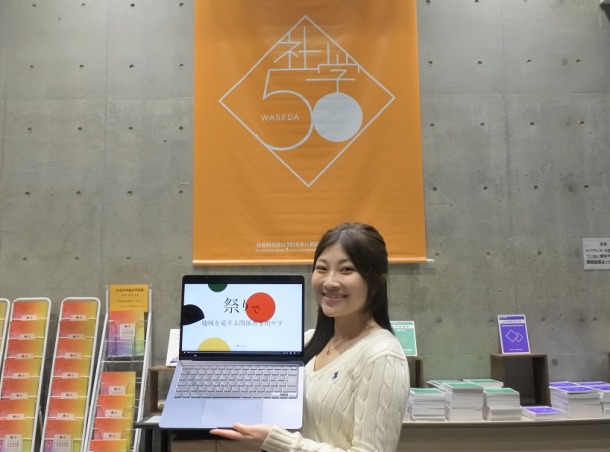
Waseda Campus Building No. 14, 1st floor
Manoka Furui founded Senbay Inc., a company that focuses on festivals and aims to create sustainable festival systems and attract talent in the local community. She has been active in various areas related to regional revitalization, including working with Waseda University's Community Collaboration Club - Yui no Me - and being selected as a member of the first batch of the Ministry of Economy, Trade and Industry's social entrepreneur acceleration program "Zeroichi". We spoke to Furui about what prompted her to start focusing on festivals, her thoughts on the company she started, and her outlook for the future.
-Why did you start paying attention to festivals?
It all started during the summer of my second year of university, when afriend from overseas requested me to show them around my hometown of Aomori Prefecture. I came up with the idea of showing him the Hachinohe Sansha Festival. Until then, I had never been involved as an "insider" in the preparation and running of a festival, or joining the procession, but when I did participate, I saw everyone, from small children to the elderly, working hard and seriously towards the common, big goal of the festival. I was deeply impressed, and at the same time, I felt that there was something important that is being lost in today's society which seeks efficiency.
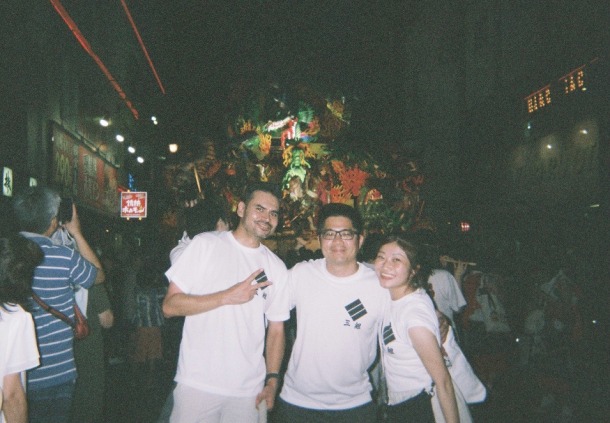
This photo was taken during my second year of university in the summer of 2023, when I was showing a festival to a friend from overseas. It was the first time I had ever participated in the Hachinohe Sansha Festival.
--What do you think is the appeal of festivals?
I think there are two attractive points about festivals. The first is that anyone can participate within the scope of their responsibility. Even though I knew nothing about festivals and was not able to contribute anything, the leaders in charge of the festival were very happy just from my participation. From this experience, I realized that even if you don't play a central role in a festival, it is important for each person to play their own role, in other words, the festival values my existence itself.
The second is the power to connect the past and present to the future. The Hachinohe Sansha Festival originally began as a prayer for a good harvest on land where crops were difficult to grow. Throughout its long history, many people have used their wisdom to pass on the festival, and as we in the present day connect it to the future, we realize that "we live in connections that transcend time and space through festivals."
On the other hand, while helping out with the festival, I heard that it was in danger of being discontinued due to a lack of people to carry it on. So I started thinking about what kind of system was needed to sustain a festival that has so much appeal and potential. To do that, I thought I needed to get to know my hometown better and spend time learning about festivals all over Japan and how they work, so I decided to take a year off from the fall semester of my second year of university to study in my hometown.
Left: During her time off school, she played the drums on top of a float that she and her friends in the Shimodaikumachifumatsuri Youth Group made.
Photo on the right: Students from universities in the Kanto region also participated in the festival thanks to connections with seniors from Hachinohe who are enrolled at other universities.
--How exactly did you learn about festivals?
The festival is held once a year and preparations are made throughout the year. So I was involved in preparing the festival throughout the year, learning about the annual schedule and arrangements while helping my boss. I also applied for the first batch of the "Zeroichi" social entrepreneur acceleration program run by the Ministry of Economy, Trade and Industry, a program for young future entrepreneurs who are trying to solve social issues, and I used this opportunity to visit local ecosystems (*) all over Japan. I went to Tango in Kyoto, Kumano Kodo in Wakayama Prefecture, Ishinomaki City in Miyagi Prefecture, and other places, connecting with people who are active in the local area and meeting and learning from people who are running businesses.
*A network of interrelated ecosystems, economies, societies, cultures, etc. that is formed within a specific region or community.
In addition, I conducted "festival training" for young people who are thinking of finding work or moving to Hachinohe City. They actually participated in the management of the festival, from the preparations to the management on the day. In the process, I was able to realize the appeal of becoming familiar with the local area through the festival. I also held a club event at a local sake brewery with the help of a Waseda University student I know who is a DJ. By actually experiencing and feeling things through the event, even people from outside the area can develop an understanding and connection to the local area. In the process, I thought that I would like to become a "translator" who connects students with companies.
Left: Second-year university students giving a presentation at the "Zeroichi" class
Right photo: In Mitoyo City, Kagawa Prefecture, which we visited as part of the program above, we stayed at a lodging where you can experience udon making and culture. A photo with Kanako Harada, who runs "UDON HOUSE"
Also, seeing people returning home for the festival, I began to wonder, "People only return home once a year for the festival, so why aren't more people wanting to work and live here?" I realized that to have a sustainable festival system, we needed to take steps to increase the number of people who wanted to live and work in the area, and this led me to start my own business.
Tell us about the company you started.
On April 1, 2025, we established Senbay Inc., which connects companies in Aomori Prefecture with students in the Tokyo metropolitan area. Specifically, we propose and implement a plan in which university students who go on to study in the Tokyo metropolitan area use their long vacations to intern at companies in Aomori, where the students act as the right-hand man of the company's manager and also participate in festivals. While students can imagine working and living in Aomori, it is also an opportunity for companies to acquire young talent from outside the region with new perspectives. We are working to create an environment in which young talent can take on challenges in rural and regional areas, and to spread the appeal of this more widely.
--I heard that you are also carrying out activities related to Aomori Prefecture at your university. What kind of activities are they?
I am also involved in the activities of the Waseda University Community Collaboration Club - Yui no Me. When I presented my activities in class, I met the founder of Yui no Me, who had the same idea as me at the time, and we started working together.
The event I was involved in invited companies in Aomori Prefecture and students from the Tokyo metropolitan area, including Waseda University students, to learn about and deepen their understanding of the careers students can pursue in the local area. I believe this was possible only because of the student community Yui no Me, who are taking courses on regional collaboration and regional contribution at university. Working with the peers I met at Yui no Me on projects, exchanging and learning about each other's activities, and connecting with people who share the same interests was of great help to me more than anything.
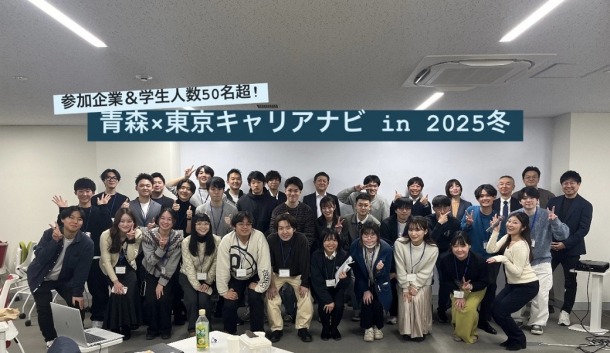
Yui no Me's event "Aomori x Tokyo Career Navi" was held for people in their 20s who want to live their own way. It was a huge success with over 50 participants!
--Please tell us your future goals.
I want to change the way young people and the elite view leadership today. I feel that negative perceptions of regional areas, such as wage and educational disparities, are still deeply rooted. However, like festivals, regional areas are actually full of possibilities for people to create something with their own hands. I want more people to know about this possibility, so that more people will turn their attention to regional areas. In such an environment that is perfect for taking on challenges, I want more people to be able to thrive and be themselves, and I would be very happy if such people were to come out of Waseda.
Personally, I would like to continue working at the company I founded, and someday I would like to work in Aomori while raising my child and become a role model who is successful in balancing work and child-rearing in the countryside.
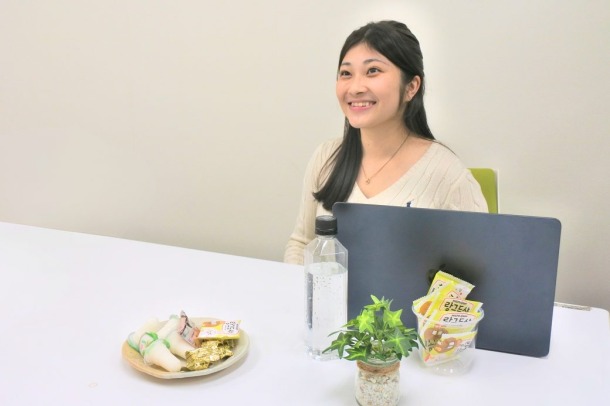
Ms. Furui being interviewed at Waseda Campus Building No.19-2 , the Waseda Co-creation Space, the site of Yui no Me's activities.
899th
Interview, text and photography: Waseda Weekly Reporter (SJC student staff)
Honoka Yasunobe, 3rd year School of Culture, Media and Society
【Profile】
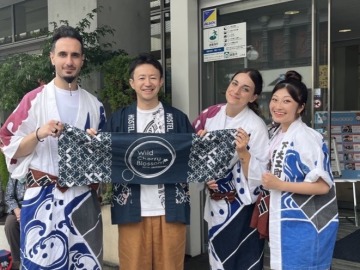
A "festival training" session was held for business operators planning to open accommodation facilities in Hachinohe. Furui is on the far right.
Born in Aomori Prefecture. Graduated from Hachinohe St. Ursula Academy High School. Her hobby is visiting abura soba restaurants, and his favorite is Menji, a specialty abura soba restaurant. She likes Japanese sake, and her latest fad is comparing local Aomori sakes. When she was in elementary school, she was inspired by Chiune Sugihara, who is famous for saving Jewish refugees with her "Visas for Life," and decided to enter Waseda University. She currently lives an active life, traveling back and forth between Tokyo and Aomori.

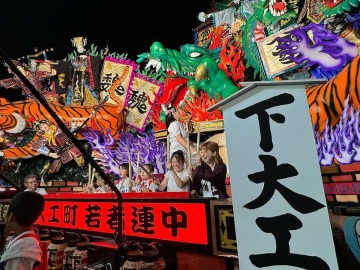
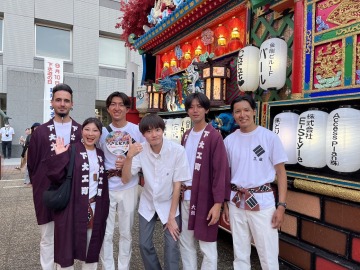
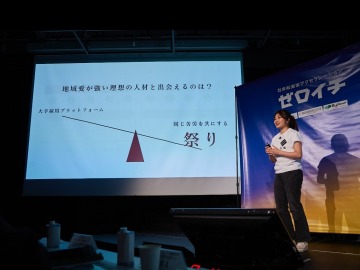
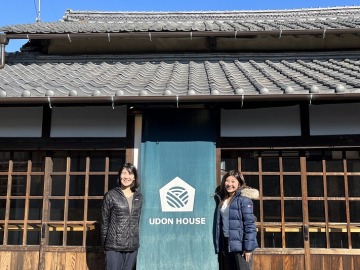
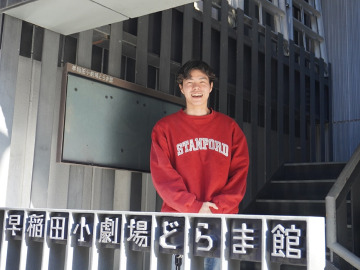
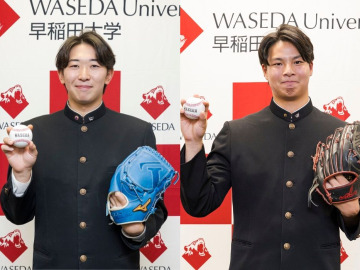
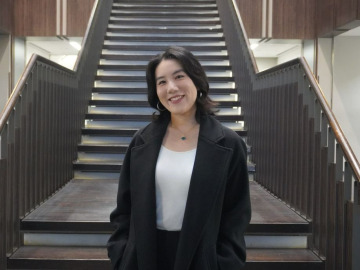
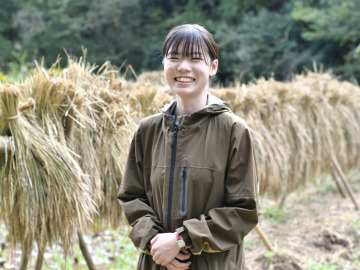

![[Save version] Map of the four main campuses](https://www.waseda.jp/inst/weekly/assets/uploads/2025/09/17cb2975123fc5103172ef60bd98608d-610x458.jpg)

